Презентация Week 1 Introduction to Tourism AGB 2003

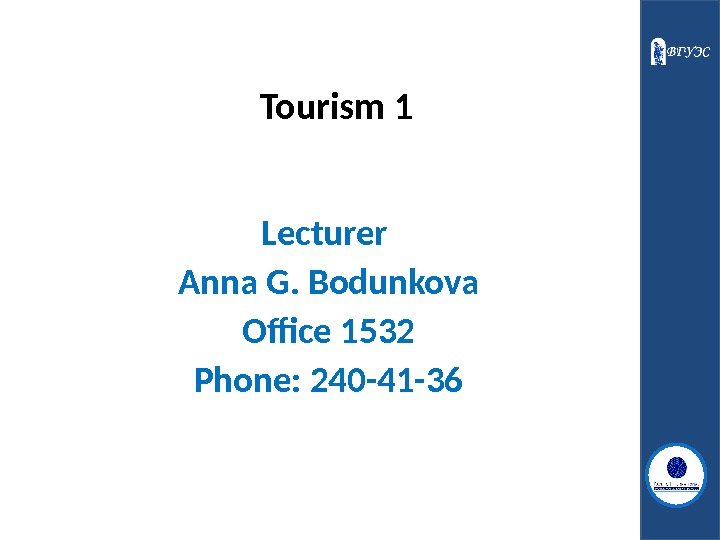
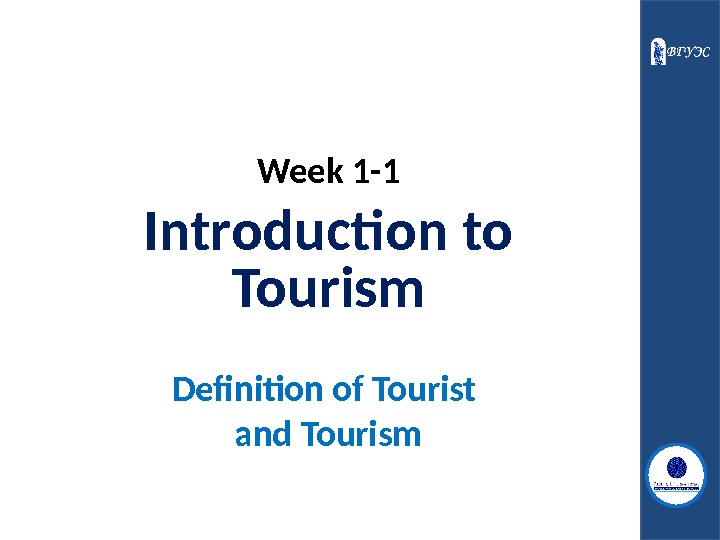
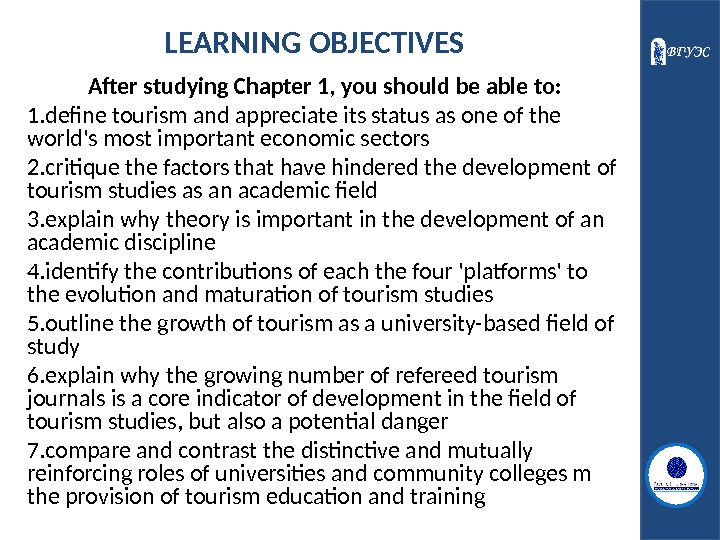
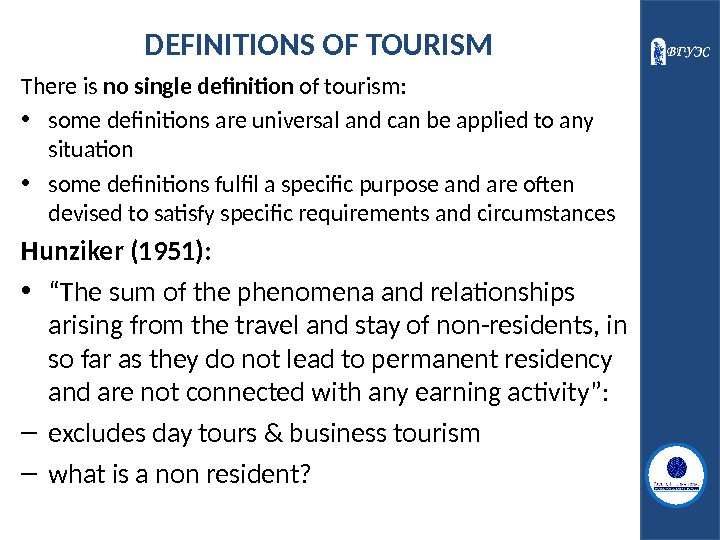
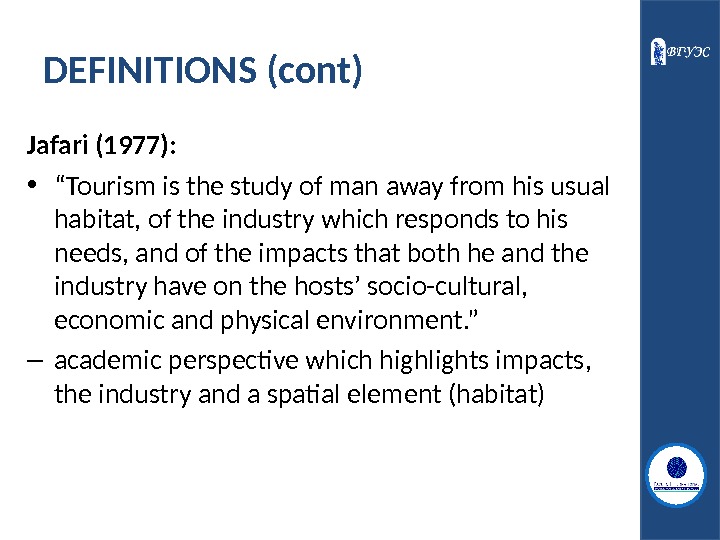
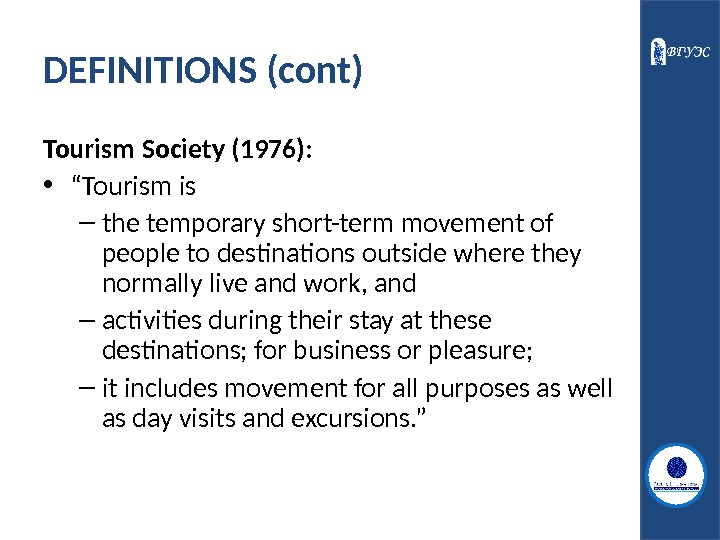
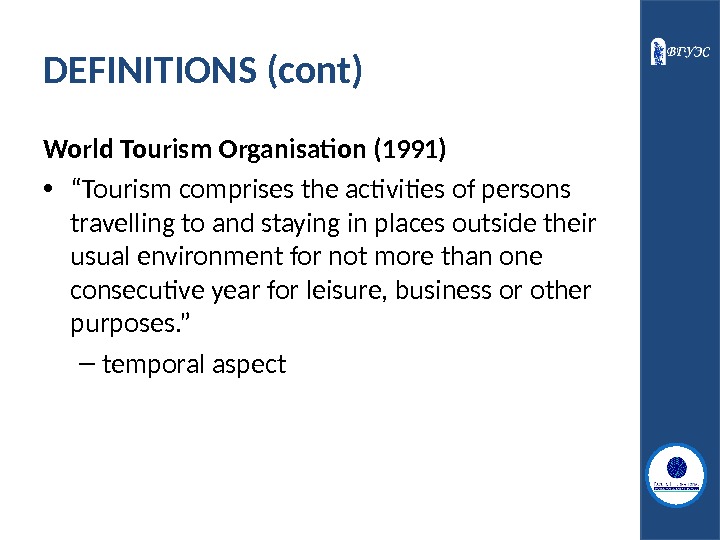
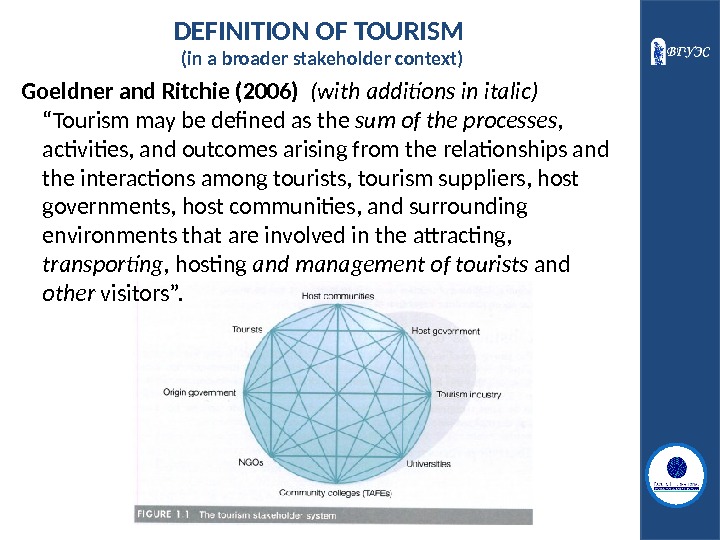
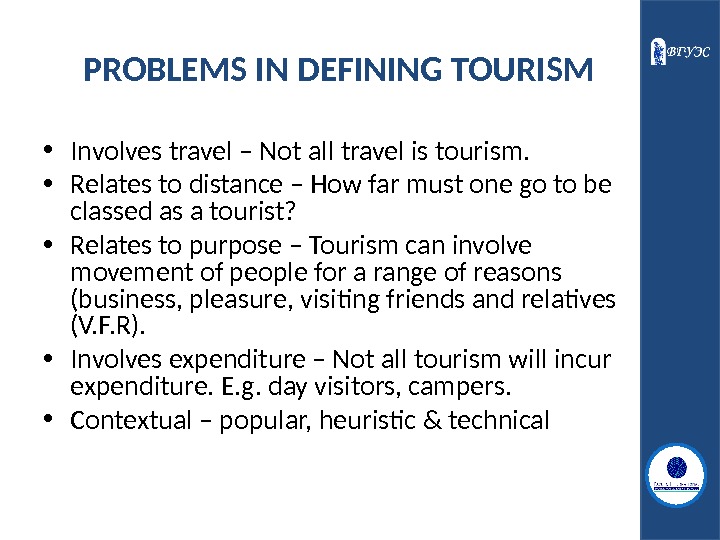
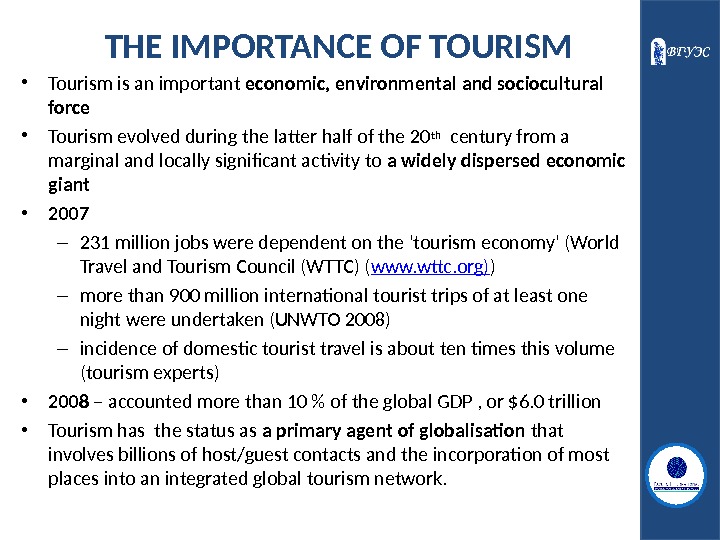
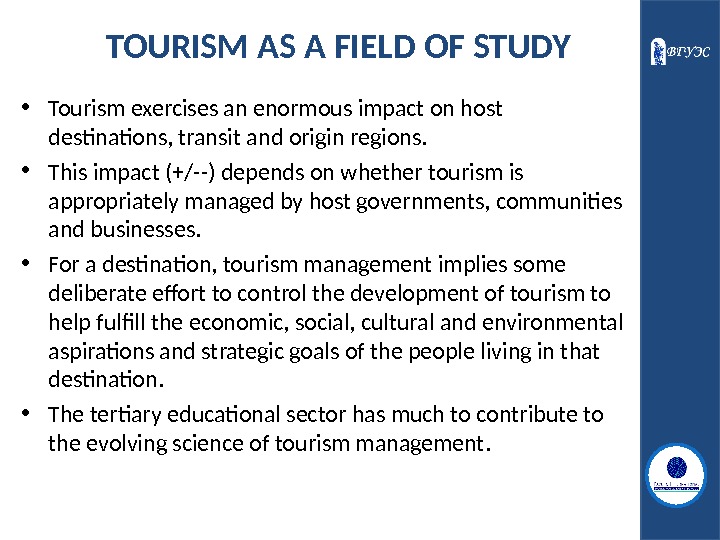
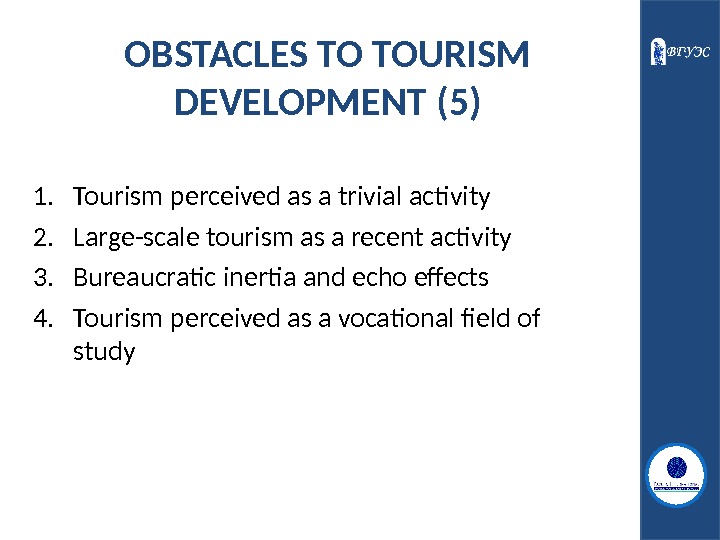
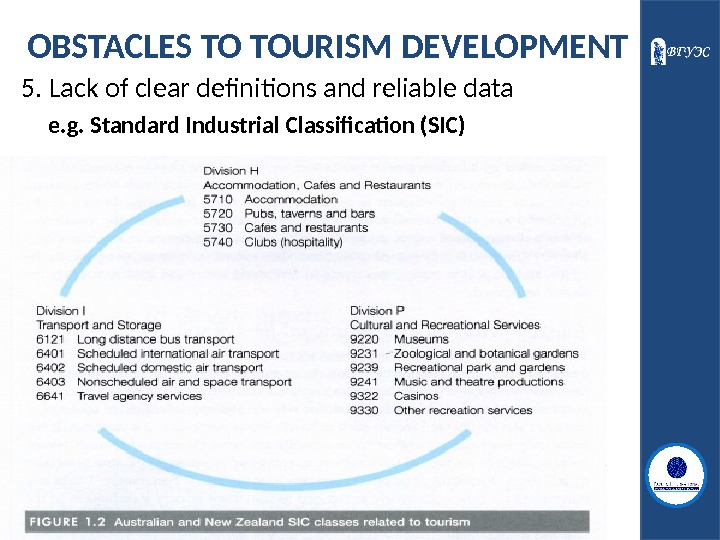
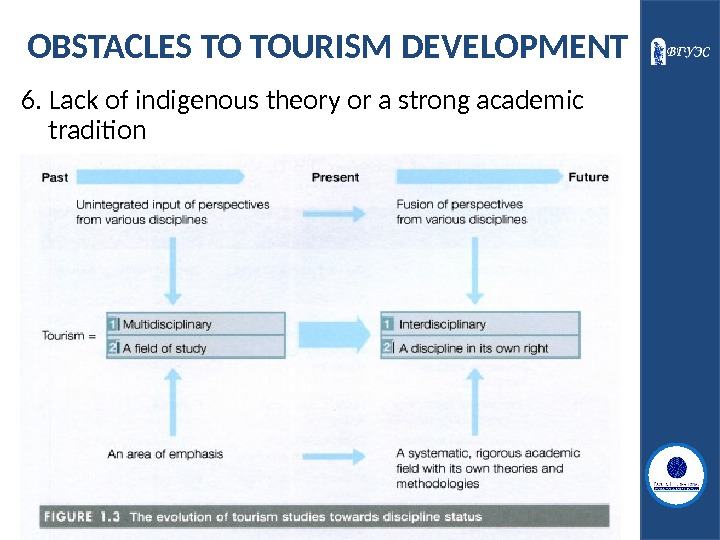
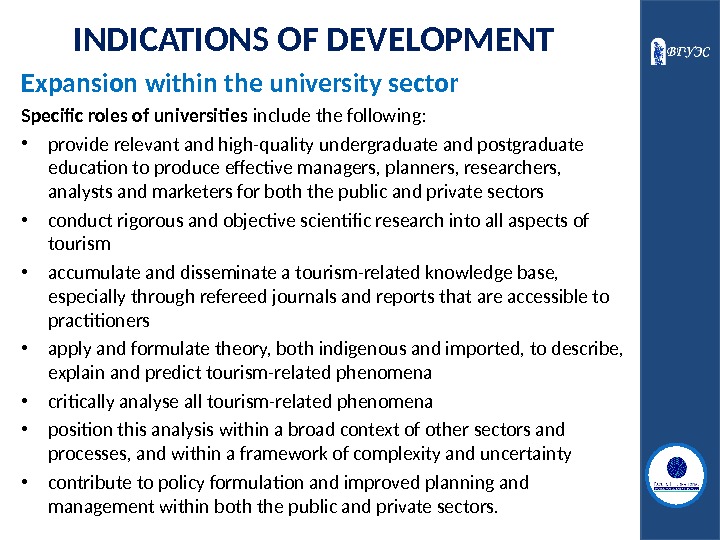
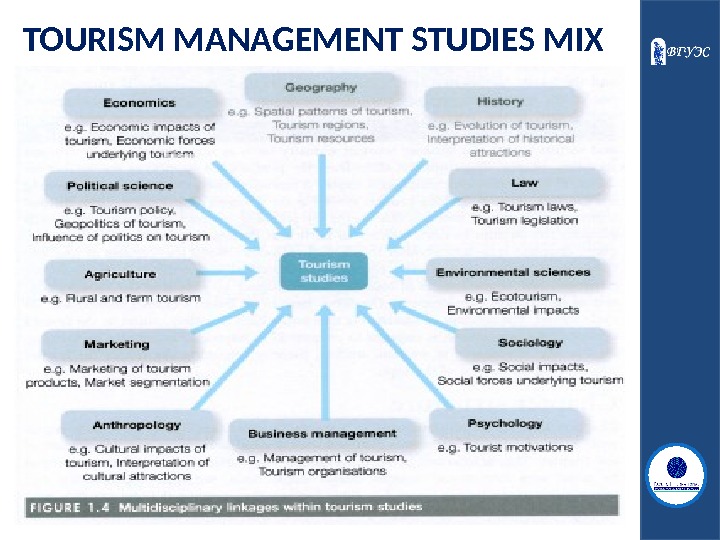
week_1_introduction_to_tourism_agb_2003.ppt
- Размер: 1 Mегабайта
- Количество слайдов: 16
Описание презентации Презентация Week 1 Introduction to Tourism AGB 2003 по слайдам
 Tourism 1 Lecturer Anna G. Bodunkova Office 1532 Phone: 240 -41 —
Tourism 1 Lecturer Anna G. Bodunkova Office 1532 Phone: 240 -41 —
 Week 1 -1 Introduction to Tourism Definition of Tourist and Tourism
Week 1 -1 Introduction to Tourism Definition of Tourist and Tourism
 LEARNING OBJECTIVES After studying Chapter 1, you should be able to: 1. define tourism and appreciate its status as one of the world’s most important economic sectors 2. critique the factors that have hindered the development of tourism studies as an academic field 3. explain why theory is important in the development of an academic discipline 4. identify the contributions of each the four ‘platforms’ to the evolution and maturation of tourism studies 5. outline the growth of tourism as a university-based field of study 6. explain why the growing number of refereed tourism journals is a core indicator of development in the field of tourism studies, but also a potential danger 7. compare and contrast the distinctive and mutually reinforcing roles of universities and community colleges m the provision of tourism education and training
LEARNING OBJECTIVES After studying Chapter 1, you should be able to: 1. define tourism and appreciate its status as one of the world’s most important economic sectors 2. critique the factors that have hindered the development of tourism studies as an academic field 3. explain why theory is important in the development of an academic discipline 4. identify the contributions of each the four ‘platforms’ to the evolution and maturation of tourism studies 5. outline the growth of tourism as a university-based field of study 6. explain why the growing number of refereed tourism journals is a core indicator of development in the field of tourism studies, but also a potential danger 7. compare and contrast the distinctive and mutually reinforcing roles of universities and community colleges m the provision of tourism education and training
 DEFINITIONS OF TOURISM There is no single definition of tourism: • some definitions are universal and can be applied to any situation • some definitions fulfil a specific purpose and are often devised to satisfy specific requirements and circumstances Hunziker (1951): • “ The sum of the phenomena and relationships arising from the travel and stay of non-residents, in so far as they do not lead to permanent residency and are not connected with any earning activity”: – excludes day tours & business tourism – what is a non resident?
DEFINITIONS OF TOURISM There is no single definition of tourism: • some definitions are universal and can be applied to any situation • some definitions fulfil a specific purpose and are often devised to satisfy specific requirements and circumstances Hunziker (1951): • “ The sum of the phenomena and relationships arising from the travel and stay of non-residents, in so far as they do not lead to permanent residency and are not connected with any earning activity”: – excludes day tours & business tourism – what is a non resident?
 DEFINITIONS (cont) Jafari (1977): • “ Tourism is the study of man away from his usual habitat, of the industry which responds to his needs, and of the impacts that both he and the industry have on the hosts’ socio-cultural, economic and physical environment. ” – academic perspective which highlights impacts, the industry and a spatial element (habitat)
DEFINITIONS (cont) Jafari (1977): • “ Tourism is the study of man away from his usual habitat, of the industry which responds to his needs, and of the impacts that both he and the industry have on the hosts’ socio-cultural, economic and physical environment. ” – academic perspective which highlights impacts, the industry and a spatial element (habitat)
 DEFINITIONS (cont) Tourism Society (1976): • “ Tourism is – the temporary short-term movement of people to destinations outside where they normally live and work, and – activities during their stay at these destinations; for business or pleasure; – it includes movement for all purposes as well as day visits and excursions. ”
DEFINITIONS (cont) Tourism Society (1976): • “ Tourism is – the temporary short-term movement of people to destinations outside where they normally live and work, and – activities during their stay at these destinations; for business or pleasure; – it includes movement for all purposes as well as day visits and excursions. ”
 DEFINITIONS (cont) World Tourism Organisation (1991) • “ Tourism comprises the activities of persons travelling to and staying in places outside their usual environment for not more than one consecutive year for leisure, business or other purposes. ” – temporal aspect
DEFINITIONS (cont) World Tourism Organisation (1991) • “ Tourism comprises the activities of persons travelling to and staying in places outside their usual environment for not more than one consecutive year for leisure, business or other purposes. ” – temporal aspect
 DEFINITION OF TOURISM (in a broader stakeholder context) Goeldner and Ritchie (2006) (with additions in italic) “ Tourism may be defined as the sum of the processes , activities, and outcomes arising from the relationships and the interactions among tourists, tourism suppliers, host governments, host communities, and surrounding environments that are involved in the attracting, transporting, hosting and management of tourists and other visitors”.
DEFINITION OF TOURISM (in a broader stakeholder context) Goeldner and Ritchie (2006) (with additions in italic) “ Tourism may be defined as the sum of the processes , activities, and outcomes arising from the relationships and the interactions among tourists, tourism suppliers, host governments, host communities, and surrounding environments that are involved in the attracting, transporting, hosting and management of tourists and other visitors”.
 PROBLEMS IN DEFINING TOURISM • Involves travel – Not all travel is tourism. • Relates to distance – How far must one go to be classed as a tourist? • Relates to purpose – Tourism can involve movement of people for a range of reasons (business, pleasure, visiting friends and relatives (V. F. R). • Involves expenditure – Not all tourism will incur expenditure. E. g. day visitors, campers. • Contextual – popular, heuristic & technical
PROBLEMS IN DEFINING TOURISM • Involves travel – Not all travel is tourism. • Relates to distance – How far must one go to be classed as a tourist? • Relates to purpose – Tourism can involve movement of people for a range of reasons (business, pleasure, visiting friends and relatives (V. F. R). • Involves expenditure – Not all tourism will incur expenditure. E. g. day visitors, campers. • Contextual – popular, heuristic & technical
 THE IMPORTANCE OF TOURISM • Tourism is an important economic, environmental and sociocultural force • Tourism evolved during the latter half of the 20 th century from a marginal and locally significant activity to a widely dispersed economic giant • 2007 – 231 million jobs were dependent on the ‘tourism economy’ (World Travel and Tourism Council (WTTC) ( www. wttc. org ) ) – more than 900 million international tourist trips of at least one night were undertaken (UNWTO 2008) – incidence of domestic tourist travel is about ten times this volume (tourism experts) • 2008 – accounted more than 10 % of the global GDP , or $6. 0 trillion • Tourism has the status as a primary agent of globalisation that involves billions of host/guest contacts and the incorporation of most places into an integrated global tourism network.
THE IMPORTANCE OF TOURISM • Tourism is an important economic, environmental and sociocultural force • Tourism evolved during the latter half of the 20 th century from a marginal and locally significant activity to a widely dispersed economic giant • 2007 – 231 million jobs were dependent on the ‘tourism economy’ (World Travel and Tourism Council (WTTC) ( www. wttc. org ) ) – more than 900 million international tourist trips of at least one night were undertaken (UNWTO 2008) – incidence of domestic tourist travel is about ten times this volume (tourism experts) • 2008 – accounted more than 10 % of the global GDP , or $6. 0 trillion • Tourism has the status as a primary agent of globalisation that involves billions of host/guest contacts and the incorporation of most places into an integrated global tourism network.
 TOURISM AS A FIELD OF STUDY • Tourism exercises an enormous impact on host destinations, transit and origin regions. • This impact (+/—) depends on whether tourism is appropriately managed by host governments, communities and businesses. • For a destination, tourism management implies some deliberate effort to control the development of tourism to help fulfill the economic, social, cultural and environmental aspirations and strategic goals of the people living in that destination. • The tertiary educational sector has much to contribute to the evolving science of tourism management.
TOURISM AS A FIELD OF STUDY • Tourism exercises an enormous impact on host destinations, transit and origin regions. • This impact (+/—) depends on whether tourism is appropriately managed by host governments, communities and businesses. • For a destination, tourism management implies some deliberate effort to control the development of tourism to help fulfill the economic, social, cultural and environmental aspirations and strategic goals of the people living in that destination. • The tertiary educational sector has much to contribute to the evolving science of tourism management.
 OBSTACLES TO TOURISM DEVELOPMENT (5) 1. Tourism perceived as a trivial activity 2. Large-scale tourism as a recent activity 3. Bureaucratic inertia and echo effects 4. Tourism perceived as a vocational field of study
OBSTACLES TO TOURISM DEVELOPMENT (5) 1. Tourism perceived as a trivial activity 2. Large-scale tourism as a recent activity 3. Bureaucratic inertia and echo effects 4. Tourism perceived as a vocational field of study
 OBSTACLES TO TOURISM DEVELOPMENT 5. Lack of clear definitions and reliable data e. g. Standard Industrial Classification (SIC)
OBSTACLES TO TOURISM DEVELOPMENT 5. Lack of clear definitions and reliable data e. g. Standard Industrial Classification (SIC)
 OBSTACLES TO TOURISM DEVELOPMENT 6. Lack of indigenous theory or a strong academic tradition
OBSTACLES TO TOURISM DEVELOPMENT 6. Lack of indigenous theory or a strong academic tradition
 INDICATIONS OF DEVELOPMENT Expansion within the university sector Specific roles of universities include the following: • provide relevant and high-quality undergraduate and postgraduate education to produce effective managers, planners, researchers, analysts and marketers for both the public and private sectors • conduct rigorous and objective scientific research into all aspects of tourism • accumulate and disseminate a tourism-related knowledge base, especially through refereed journals and reports that are accessible to practitioners • apply and formulate theory, both indigenous and imported, to describe, explain and predict tourism-related phenomena • critically analyse all tourism-related phenomena • position this analysis within a broad context of other sectors and processes, and within a framework of complexity and uncertainty • contribute to policy formulation and improved planning and management within both the public and private sectors.
INDICATIONS OF DEVELOPMENT Expansion within the university sector Specific roles of universities include the following: • provide relevant and high-quality undergraduate and postgraduate education to produce effective managers, planners, researchers, analysts and marketers for both the public and private sectors • conduct rigorous and objective scientific research into all aspects of tourism • accumulate and disseminate a tourism-related knowledge base, especially through refereed journals and reports that are accessible to practitioners • apply and formulate theory, both indigenous and imported, to describe, explain and predict tourism-related phenomena • critically analyse all tourism-related phenomena • position this analysis within a broad context of other sectors and processes, and within a framework of complexity and uncertainty • contribute to policy formulation and improved planning and management within both the public and private sectors.
 TOURISM MANAGEMENT STUDIES MIX
TOURISM MANAGEMENT STUDIES MIX

